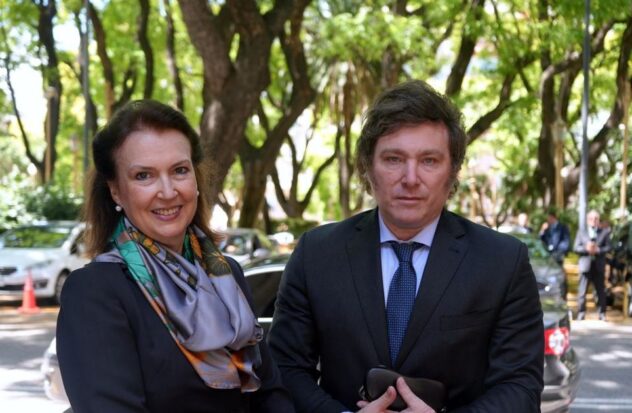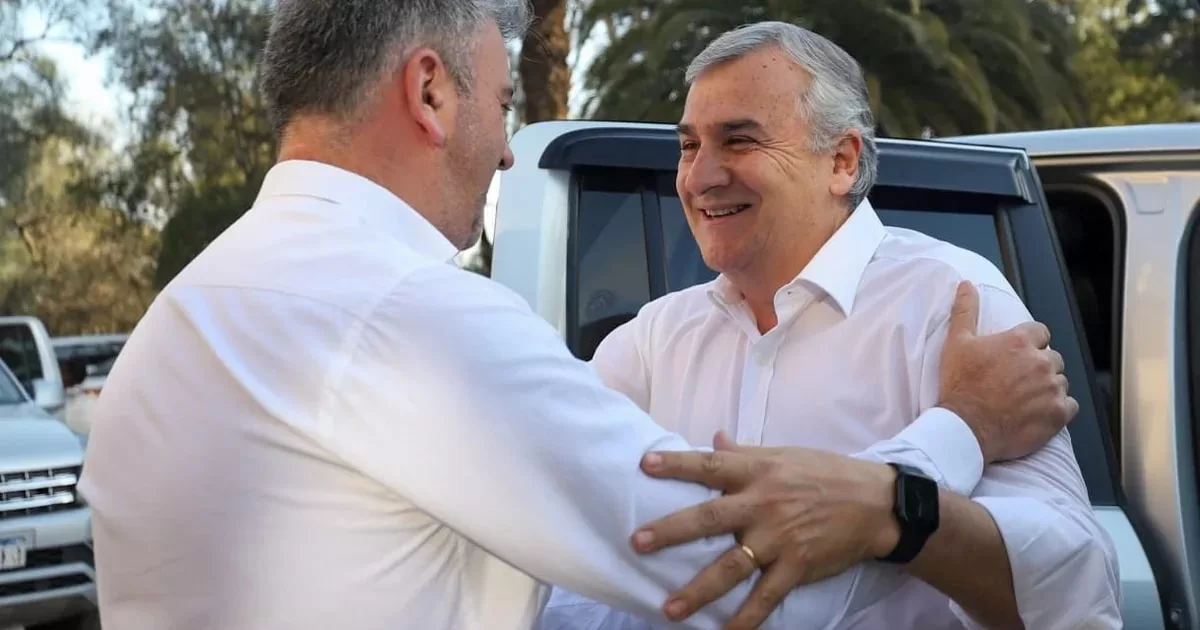In Venezuela “There is a military leadership that supports the government, but in the armed institution, as a whole, the collapse and unpopularity of the government must also be reflected.” This evaluation of the Venezuelan military world was made by the now candidate of the opposition unit, Edmundo González Urrutia, during a conference given in Mexico on 28SEP17 promoted by the German Christian Democrat foundation Konrad-Adenauer-Stiftung. Outside the focus of the press, for two decades as an operator of the Venezuelan opposition, the diplomat González Urrutia expressed his political considerations in many different forums, including the military issue, key to understanding the Venezuelan dictatorship of which the military hierarchy is active part.
Now as a presidential candidate, González Urrutia, in a speech read during his first mass event on 18MAY24, addressed the military: “to the national armed force, you play a fundamental role in everyone’s security. “I will be the guarantor of its institutionality as stated in article 328 of the Constitution.” Article 328 of the Chavista constitution establishes that “The National Armed Forces constitute an essentially professional institution, without political militancy, organized by the State to guarantee the independence and sovereignty of the Nation and ensure the integrity of the geographical space…”.
González Urrutia has also already referred to relations with the Cuban dictatorship, if he reaches the Presidency. “We must review relations with Cuba,” he told Voz de América journalists on 22MAY24.
*****
The European Union has not yet approved the sending of an electoral observation mission for the votes called by Chavismo for 28JUL24.
While the opposition, grouped around the candidacy of Edmundo González Urrutia, calls for international presence during the process, in the European Union internal consultations continue evaluating the Venezuelan situation and the relevance of sending an EOM. The time that the EU would have to organize and deploy the EOM is a particularly critical issue since according to the organization’s own manuals it requires up to six months. The deployment of an EOM is preceded by a long process that ranges from the signing of an agreement with the recipient country, the selection of a head of mission that involves a process of political consultations, the recruitment of personnel and the contracting of logistical support and , preparations for the movement five weeks in advance of the first wave of observers. All this before the arrival of the bulk of the EOM.
The EU Foreign Affairs Council is scheduled to meet on 27-28MAY24 in Brussels. The program for the session on Monday 27MAY24 includes among the “current affairs” an intervention by the head of European diplomacy, Josep Borrell, who will report on “the latest events in Venezuela, emphasizing the electoral process.” An official spokesperson for the European External Action Service, consulted by the Otálvora Reportassured that it is only “an informative point” and the Foreign Ministers are not expected to make any decision about Venezuela that day.
Sending an EOM to Venezuela for the 28JUL24 votes is in the hands of Borrell.
*****
The Venezuelan regime is inviting dozens of politically related governments and international organizations with the purpose of giving legitimacy to its votes and downplaying the possible presence of an EU technical mission. The regime has vetoed the presence of an OAS mission and only agreed to invite the Carter Center and a UN “panel of experts.” Even senior leaders of the regime maintain the position of not allowing the presence of the EU.
On 07MAR24, Chavismo’s electoral council extended an invitation to the EU to send observers “as long as they comply with constitutional and legal regulations.” A month later, on 07APR24, an exploratory mission arrived in Caracas for the usual meetings with authorities and political sectors. The purpose of that mission is to determine whether sending an EOM is “useful, feasible and advisable.” Borrell’s decision to send the EOM depends on the content of the exploratory mission report and the position of governments and other EU political actors interested in the issue. The EU spokesperson consulted by the Otálvora Report let it be known that the organization, after the visit of the exploratory mission, “has continued to collaborate with the Venezuelan authorities in relation to the possible deployment of an EU EOM”, probably in the definition of the content of the “memorandum of understanding” that would regulate the actions of the EOM. A sensitive issue is the operational limitations that Chavismo usually imposes on electoral observation missions in terms of issuing reports on the electoral process. In statements offered to this Report on 24MAY24, the EU spokesperson stated that “we are currently still analyzing the conclusions of this exploratory mission” and Borrell “will make a decision shortly after concluding his consultations with the EU Member States and the European Parliament.” ”.
A mission with a limited mandate could be the option that the EU assumes given the imminence of the votes in Venezuela.
*****
On 26MAR24 the Argentine government made public that it had welcomed six Venezuelans persecuted by the regime into its embassy in Caracas. From that moment on, negotiations began with Javier’s government. mercy with the Chavista Foreign Ministry seeking the issuance of safe-conducts that would allow the group formed mostly by members of María Corjna Machado’s central work team to leave the country. That same day, the Argentine presidency issued a statement stating that “The Argentine Republic, rooted in its historical vocation to promote and safeguard fundamental human rights, and exercising its effective commitment in this regard, expresses its concern at the deterioration of the situation.” institutional and acts of harassment and persecution directed against public figures in Venezuela.
The Venezuelan journalist Vladimir Villegas, who held a diplomatic position in Mexico sent by Hugo Chávez and usually airs intimacies of the regime, assured on 02APR24 that the Chavista foreign ministry was preparing to deliver the safe passages. Three days later, the Argentine Foreign Minister, Diana Mondino, confirmed that her government had already granted asylum to the six Venezuelans who remained under its protection at the diplomatic headquarters in Caracas, although she warned that they had not yet received the requested safe passage despite because the Chavista foreign ministry offered them to Argentina. Thus began a process of extortion by the regime towards the government of Javier Milei.
*****
The Venezuelans who remain in the residence of the Argentine ambassador in Caracas are Magalli Meda, the head of the MCM electoral campaign, held as his “right hand”, the political scientist Pedro Urruchurtu in charge of international relations for the MCM party, the journalist Claudia Macero in charge of communications, Omar González parliamentarian and electoral coordinator of MCM in the state of Anzoátegui, Humberto Villalobos electoral coordinator of the party and the businessman and opposition activist Fernando Martínez Mottola who is not part of the direct team of MCM.
All of them were accused by the regime’s prosecutor, Tarek William Saab, of planning “destabilizing actions” to pressure the regime to accept MCM’s candidacy. The members of the MCM team had already been subject to arrest warrants by the Chavista prosecutor’s office on 06DEC23 when they were accused of maintaining relations with the Exxon oil company that exploits crude oil in Guyana. The Chavista prosecutor ordered their arrest, blaming them for “immemorial hatred against the people of Venezuela.” On that occasion, the MCM team secretly sought refuge in diplomatic headquarters in Caracas for several weeks, when they were accused of treason, criminal association, conspiracy and money laundering. As part of the negotiations between the US government and the Venezuelan dictatorship that led to a prisoner exchange on DEC 2023, the negotiator for Maduro, Jorge Rodríguez, would have committed to nullifying the judicial process against the MCM team. That version was made public by Juan González who was one of the American negotiators in those days. The members of the MCM team, trusting in what was negotiated by the White House with Maduro, abandoned their diplomatic refuge. They were not arrested, but measures were imposed on them that prevented them from leaving the country, forcing them to attend court venues regularly. Finally, on 20MAR24, the regime’s Attorney General, resumed the judicial prosecution against the MCM team, fulfilling an obvious plan to weaken the operational platform of the opposition leader and threatening once again to prosecute her.
The inclusion of Fernando Martínez Mottola on the list of arrest warrants caught the attention of the political world. Martínez Mottola, who was a minister in the second government of Carlos Andrés Pérez and had a successful business career in the telecommunications sector for several decades, has been in recent years an important operator behind the scenes of the Venezuelan opposition, as has also been the now candidate Edmundo González Urrutia.
*****
The announcement by the Chavista Foreign Ministry to the head of the Argentine diplomatic mission in Caracas, regarding the issuance of safe conduct, caused the Argentine Foreign Ministry to begin the process to evacuate the Venezuelan asylum seekers. They would leave Venezuela for Buenos Aires on a commercial flight, via Panama, due to the ban imposed by Maduro on Argentine commercial airlines. As will be remembered, on 12FEB24 the Argentine government executed the ruling of a Buenos Aires court that ordered the delivery to the US of a Boeing 747-300M freighter, property of the Venezuelan state company Emtrasur. The aircraft had been detained since 2002, by orders of the government of leftist Alberto Fernández, at the Ezeiza International Airport. The aircraft had been transferred by the government of Iran to Venezuela in violation of US trade sanctions.
The travel plan of the asylum seekers through Panama was rejected by the regime, alleging that a commercial flight from a third country was not acceptable because it could generate protests at the Maiquetía airport by Chavista militants. The regime also alleged the very curious excuse according to which the asylum seekers intended to detour to the US upon landing in Panama. Since the beginning of April, the regime requires that asylum seekers leave on a private aircraft with Argentine registration that travels from Argentina on a direct flight. Fears that this aircraft would be seized, in retaliation for the Emtrasur aircraft, would have advised the Milei government against sending an aircraft to Caracas. Diplomatic sources in Caracas and Brasilia assure that the governments of Mexico, Colombia and Brazil would have been willing to provide aircraft for the evacuation of Venezuelan asylum seekers, but the regime has not accepted those options.
Javier Milei refuses to send an ambassador to the Chavista regime. The Argentine diplomat with the rank of plenipotentiary minister Andrés Mangiarotti, has just arrived in Caracas to assume the leadership of the diplomatic mission as Chargé d’Affaires. In Buenos Aires they hope that Mangiarotti, who is a career diplomat, manages to resume negotiations with the dictatorship to unblock the issue of asylum seekers. It is unknown what price the regime aspires to charge in exchange for the asylum seekers and there is even doubt that the regime’s hardliners are willing to let the MCM team leave.
*****
In the same direction, senior Chavista leaders aborted a negotiation process promoted and carried out by the governments of Colombia and Brazil, with the support of Chile and Mexico, for the signing of an agreement between the regime and the Opposition with a view to respecting the election results of 28JUL24. After various meetings held at diplomatic headquarters in Caracas in which opposition representatives participated and from which a draft text even emerged, Gustavo Petro’s initiative for a political transition in Venezuela was rejected by the Chavista regime.
*****
This Report does not use Artificial Intelligence tools in its writing.


